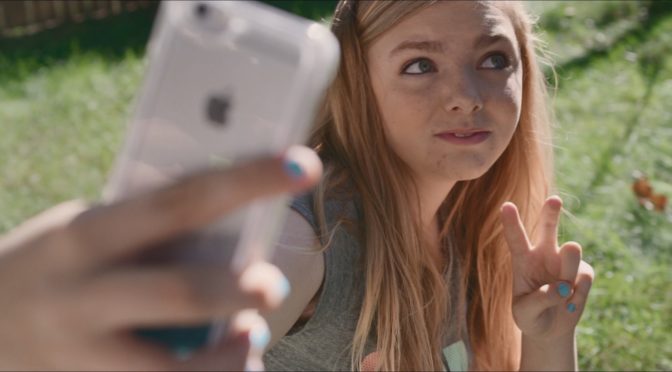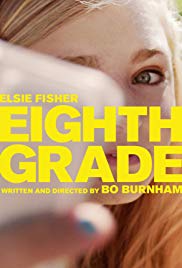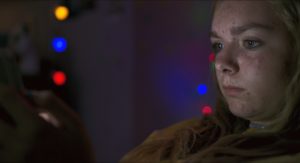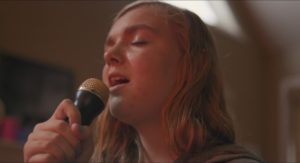The nitpicky critic in me tends to steer away from any material extraneous to the film. I basically don’t care about what a director or a performer is like outside of their work, and, while I enjoy a good behind-the-scenes anecdote as much as the next person, I typically don’t need to hear about it or write about it in a film review. It all feels a little too extracurricular to me. But occasionally I have to make an exception. Sometimes a bit of lore or trviia from outside of the films feels so on brand that it naturally becomes part of how I think about the film. Like Mick Jagger turning the set of Performance into a months-long hedonistic garden of vice (thereby turning co-star James Fox into a lifelong conservative). Or Stanley Kubrick pushing Shelley Duvall to the brink of sanity with an ungodly amount of takes in The Shining. Sometimes a story from the film just feels too right as an extension of the film itself. In the case of Bo Burnham’s pitch-perfectly anxious, subtly empathetic adolescent character-study-cum-mood-piece, I think of a production photograph. The 28 year-old first-time director and his even greener leading performer, 16 year-old Elsie Fisher, (subtle, lovable, and ever so relatably awkward as the film’s 14 year-old protagonist) are seated on the floor of a middle school hallway, leaning their backs against some lockers. They appear to just be in the middle of some conversation, laughing and listening to one another. It’s nothing so surprising. I imagine most directors have friendly chats with their actors, figuring out what the next scene will need to really sing. But there’s an understated empathyto this moment that is part and parcel with the film. This is the story of a shy, fumbling eighth grade girl, as directed by a white man in his late twenties. Burnham knows he is not telling his own story. He is telling the story of young girls like Elsie Fisher or really any woman who remembers being that age. His job is to be empathetic and open and the learn everything he can from her. To make her feel happy and open and at ease with exploring this young woman’s inner life. I see this photograph and am not only moved by their sweet, easy rapport (while extracurricular material is still on the table, Fisher and Burnham were also an adorably chummy fixture on the 2018 awards circuit, before that mean girl they call Oscar kept them out of the big party). That photograph also just makes sense as an essential document of the film that follows. What makes Eighth Grade such a lovely and beautifully observant character study is that the man in the director’s chair knows to mostly give the reins to his superb female actor. She is there to make this story resonate through her vivid characterization. It’s his job to give her the space to tell that story and to capture it as perceptively as he can. Most of all, it’s his job to ensure that the audience follows his lead and listens attentively to this sweet, soft-spoken young woman. Bo Burnham and Elsie Fisher give us one of the most empathetic duets in recent cinema. That picture bears witness to their harmony and chemistry, though nothing can compare with the what they have lovingly put up on screen.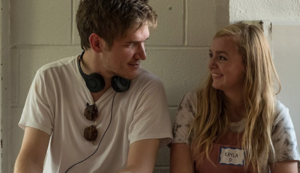
Eighth Grade covers an awkward, shy 14 year-old girl’s last few months of middle school. Kayla Day knows she is at a sensitive and precarious stage, as most people her age are. Kayla has gotten used to feeling awkward over the past few years. What seems to bother her more is being seen as shy by her peers. At her school’s annual awards assembly for graduating students, she wins Most Quiet and her reaction to this dubious honor is one of the most mortified facial expressions you’ll see in a film. While Kayla has trouble talking to her classmates, tongue-tied is not the way she sees herself. Somewhere beneath her timid exterior is a vibrant conversationalist and deep thinker. The film’s recurring framing device is a series of teenage social advice videos that she puts up on her sparsely viewed YouTube channel. Eighth Grade is a coming-of-age character study about an insecure, kind-hearted young lady striving and struggling to navigate the turbulent transition to high school, and to close out those three puberty-addled years that are the bane of so many adolescent existences. At times, it also feels ever so slightly like an experimental film. It’s full of frenetic editing, moody lulls, and artfully jarring sound design. Part of that unsettling aura comes from British composer Anna Meredith’s terrifically effective electronic panic attack of a score. An even larger part comes from Bo Burnham’s sharp instincts for amplifying mood. Eighth Grade consists of a number of setpieces that astutely capture the anxiety and guarded elation of those early teenage years. Kayla gets invited to an aloof classmate’s pool party. She gets the chance to socialize with a group of high schoolers and catches a glimpse of adolescent challenges still to come. She also pines for a cocksure, absurdly stoic cool boy and starts a friendship with a hyper-talkative, gangly boy whose energy seems much more in tune with her own. When not braving the tween trenches, Kayla spends her time at home trying to ignore her well-meaning and intermittently exasperating dork of a single father (Josh Hamilton, terrifically endearing and sympathetic), and burying herself in the simultaneously stimulating and soothing deluge of social media. Eighth Grade is a strange but perfectly tailored hybrid of character study, gripping drama, and observational comedy (until now, Bo Burnham was known for his standup comedy, which often commented on youth culture in the Internet age). Its chief strength may be that Burnham infuses his film with bold, stylistic flourishes to recreate the heightened unease of middle school life while always keeping one foot firmly in empathetic territory. He sees this time of life through a woozy, distorted lens, but he always looks at his protagonist with clear compassion and warm concern.
Still, Bo Burnham whips up quite a temperamental little storm for his timid but intrepid heroine to weather. Before Kayla’s journey to the shores of high school is complete, she will have experienced a fairly constant stream of embarassment, resisted a genuinely unsettling unwanted sexual advance, and gone to a pool party that feel like a social war zone. Eighth Grade is often very funny, but Burnham also treats all of this seriously. Even when we are invited to laugh, there is nothing glib in his treatment of the hurdles young people like Kayla face. He respects what a nauseating and frightening thing it can be to be 14 years old, especially for a young woman still finding her identity. Burnham shoots with an inventive livewire energy that makes every moment its own tiny powder keg. We hear the egg shells crunching under Kayla’s feet and we watch her every subtle, anxious facial expression as she figures out how to get through the next adolescent survival test. It would be hyperbole to say that Eighth Grade has elements of horror, but it often has a buzzy aura that is not a thousand miles removed from a thriller. Simply put, it is one of 2018’s most stunningly original creations. A film about being a teenager with notes of pulse-pounding tension and paranoia that is still completely sweet and funny at its core. It’s the classic case of a chef adding some wild, unexpected ingredient to a dish (putting Sriracha sauce in a dessert, let’s say) and having it not only work but really make the dish. Eighth Grade leaves such a strong impression because stories of adolescent angst are so rarely told with this kind of idiosyncratic immediacy. Bo Burnham wants us to put ourselves in Kayla’s brain; to experience the feverish calustrophobia of her viewpoint. Burnham knows there may be no age more nerve-rattlingly subjective than puberty, when looming adulthood, your own changing body, and the moody insecurities of your peers all conspire to make you feel more perpetually off balance than you ever though possible.
Bo Burnham is also interested in the subjective dissonance between how young teenagers see themselves, how they want to be seen, and hos they see each other. The Kayla we see in her videos is still a humble young woman, but one with the intelligence and confidence to put her thoughts out there. She wants people to see her as outgoing and outspoken. Her awkward but supportive father reminds her that the very fact of having her own YouTube channel shows that she is that dynamic, interesting, well-rounded person she wants to be. The problem is it feels like no one is actually listening to that version of her voice. None of her peers at school are seeking her out for her insights, and so those thoughts mostly stay rattling around in her own already hectic brain. She is both the engaged and engaging raconteur she wants to be and the reticent wallflower who still hasn’t figured out how to loudly speak her truth in public. It is nothing new to say that puberty can be something of a paradox. A time where we are trying on an entire closet’s worth of competing identities. Elsie Fisher stutters and painfully draws out certain words as if she’s at the first table read for the script to her own life. What makes Eighth Grade so compassionately observant is how Bo Burnham sees all adolescents as actors who haven’t quite gotten their characters down yet. Even the characters you would probably identify as mean girls are painted with charitable, humane understanding. They also seem to be frantically ad-libbing their way through this crazy play, trying to workshop the role of who they will be for the rest of their lives. What none of them presently realize is that they will rewrite these parts dozens and dozens of times more. Eighth Grade feels for them all. It is a comedy, but Bo Burnham is not laughing at Kayla or any of her classmates. He is laughing with them, or more accurately with the people they will be five years from now.
Eighth Grade is a bittersweet thing of beauty. It gives us a wince and a smile, though the early going probably contains more wincing than smiling. This is the nature of the film’s journey and it turns out to be a splendid choice on Burnham’s part. The majority of the film is an arrestingly cringey dramedy of teenage manners. Eighth Grade takes Kayla and us through the miserable, sweaty gauntlet of the eighth grade, adding welcome doses of humor to keep any of the awkwardness and humiliation from being too much to bear. But as it draws closer to its conclusion, Burnham starts to add more sunlight and air to his suffocating maze. Eighth Grade has an uncanny knack for capturing adolescent dread, but its goal is not to simply provide a way to relive pubescent discomfort. This is not some exercise in vicarious teenage desperation. In the end, Bo Burnham loves Kayla too much to have Eight Grade be a chamber of horrors. Quite the opposite, it is really a reminder that this fraught, ridiculous time passes and that we emerge on the other side of the tempest. We all get better at being the selves we really want to be and we learn that toying around with the recipe of our own identities is part of life. The film’s kind but candid outlook on this time of life has helped it to resonate with a number of adult film lovers, who can remember this time with all its intensity, melodrama, and embarrassment. The alternating strains of comedy and disquieting anxiety are in the film for a very good reason. We can all look back at puberty now and have chuckle at it, while still remembering how genuinely disorienting it was. We can recall the fears we felt And then, finally and wonderfully, we can have a laugh at those fears as well.
But more than what Eighth Grade communicates to people who have already been through it, I hope it gives some kind of perspective and solace to any young person who is going through this period right now. Or is about to go through it. Like the videos Kayla films for her older selves to watch, Eighth Grade wants to be a wise, sympathetic hand on the shoulder of the young. And who knows what a current eighth grader will make of it? This communication from a man in his late twenties who has long since passed through this phase. As pitch-perfect as I find the film to be, maybe a 14 year-old of today (or decades from now) will see things that it misses about the experience. That’s probably to be expected. With a film like this, the empathy is what is really important. The very act of just trying to understand the experiences of a person in different shoes than your own. What matters is that Eighth Grade works with such sweet, gentle candor to place itself and its audience back in that state of mind. It is a wise and winningly empathetic film. And one with no ego, no lecture to give. It seeks to give voice to one of the most honest and relatable portraits of an adolescent young woman I’ve ever seen captured on film. Its aim is solely to see her; to view her desires, hopes, and anxieties with clear, generous eyes. Eighth Grade is a wonderful addition to 2018’s bountiful crop of films. The only thing we need more is to give the Kayla Days of the world more chances to tell these stories personally. To be fair, the fact that Bo Burnham has made a marvelous female coming of age story doesn’t correct the larger issue of letting women craft their own narratives. A film centered on a female character finding her voice is not remotely the same thing as actually giving women more voice in film. With that said, this industry’s glaring issues are not the fault of this lovely film and I have no desire to look a cinematic gift horse in the mouth. Eighth Grade is still the kind of film this world needs more of. One that values and loves women. One that admires them, believes in them and listens intently to what they will say next.
